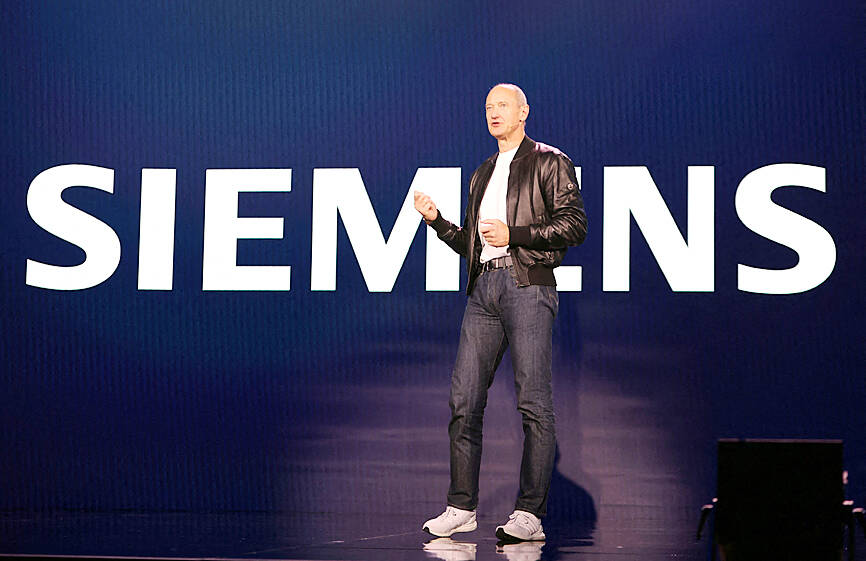Siemens AG saw orders largely stagnate in the fiscal first quarter as factory-automation purchases in China more than halved, offsetting gains in other units.
Orders plummeted 31 percent from a year earlier for the digital industries division, mainly driven by weaker private consumption in China, the company said yesterday. Siemens left its outlook for the unit and the overall group unchanged and said it sees the Chinese economy recovering later this year.
“The Chinese market is still very slow,” Siemens chief executive officer Roland Busch said. “We hope that we will see a pick-up in China in the second half of the year.”

Photo: REUTERS
Siemens and the rest of the industrial sector are grappling with weaker demand in China, where consumers and businesses have cut back on spending amid rising inflation and interest rates. The company expects China’s economy to recover in the second half of the year with the government’s push to boost high-tech manufacturing.
In recent years, Siemens has revamped its business to focus on software-driven product lines with higher profitability levels, and Busch has said Siemens could target larger acquisitions in that area this year. The company is also pursuing plans for an initial public offering or divestment of heavy-duty electric-motor manufacturer Innomotics, valued at roughly 3 billion euros (US$3.2 billion).
Siemens’ mobility unit saw orders nearly double from the same period a year earlier, largely due to two orders in Austria totaling 1.3 billion euros from existing agreements for delivery of trains.
Net income attributable to shareholders came in at 2.39 billion euros in the last quarter, boosted by a one-off 500 million euros gain from the transfer of an 8 percent stake in Siemens Energy AG to Siemens Pension-Trust e.V.
Some shareholders have urged Siemens to unload its stake in Siemens Energy, as the company posted massive losses from faulty wind turbines. Siemens said the transfer means it no longer has significant influence over Siemens Energy, and the investment is not expected to impact earnings per share going forward.

Nvidia Corp’s demand for advanced packaging from Taiwan Semiconductor Manufacturing Co (TSMC, 台積電) remains strong though the kind of technology it needs is changing, Nvidia CEO Jensen Huang (黃仁勳) said yesterday, after he was asked whether the company was cutting orders. Nvidia’s most advanced artificial intelligence (AI) chip, Blackwell, consists of multiple chips glued together using a complex chip-on-wafer-on-substrate (CoWoS) advanced packaging technology offered by TSMC, Nvidia’s main contract chipmaker. “As we move into Blackwell, we will use largely CoWoS-L. Of course, we’re still manufacturing Hopper, and Hopper will use CowoS-S. We will also transition the CoWoS-S capacity to CoWos-L,” Huang said

Nvidia Corp CEO Jensen Huang (黃仁勳) is expected to miss the inauguration of US president-elect Donald Trump on Monday, bucking a trend among high-profile US technology leaders. Huang is visiting East Asia this week, as he typically does around the time of the Lunar New Year, a person familiar with the situation said. He has never previously attended a US presidential inauguration, said the person, who asked not to be identified, because the plans have not been announced. That makes Nvidia an exception among the most valuable technology companies, most of which are sending cofounders or CEOs to the event. That includes

INDUSTRY LEADER: TSMC aims to continue outperforming the industry’s growth and makes 2025 another strong growth year, chairman and CEO C.C. Wei says Taiwan Semiconductor Manufacturing Co (TSMC, 台積電), a major chip supplier to Nvidia Corp and Apple Inc, yesterday said it aims to grow revenue by about 25 percent this year, driven by robust demand for artificial intelligence (AI) chips. That means TSMC would continue to outpace the foundry industry’s 10 percent annual growth this year based on the chipmaker’s estimate. The chipmaker expects revenue from AI-related chips to double this year, extending a three-fold increase last year. The growth would quicken over the next five years at a compound annual growth rate of 45 percent, fueled by strong demand for the high-performance computing

TARIFF TRADE-OFF: Machinery exports to China dropped after Beijing ended its tariff reductions in June, while potential new tariffs fueled ‘front-loaded’ orders to the US The nation’s machinery exports to the US amounted to US$7.19 billion last year, surpassing the US$6.86 billion to China to become the largest export destination for the local machinery industry, the Taiwan Association of Machinery Industry (TAMI, 台灣機械公會) said in a report on Jan. 10. It came as some manufacturers brought forward or “front-loaded” US-bound shipments as required by customers ahead of potential tariffs imposed by the new US administration, the association said. During his campaign, US president-elect Donald Trump threatened tariffs of as high as 60 percent on Chinese goods and 10 percent to 20 percent on imports from other countries.